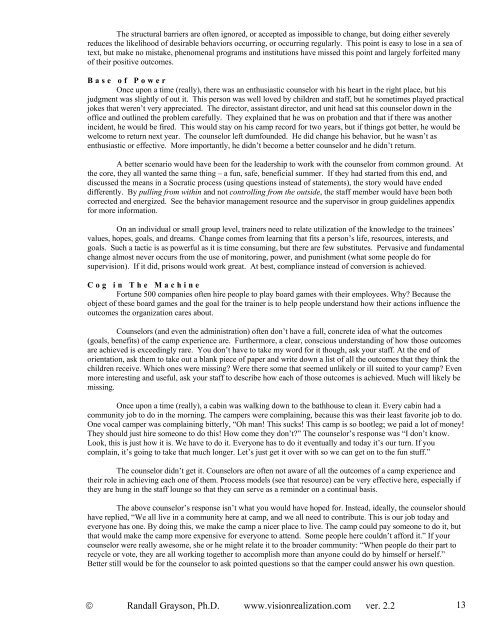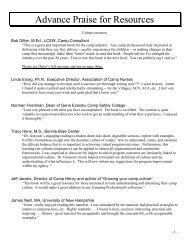Taking Camp Staff Training From Good To Best ... - Vision Realization
Taking Camp Staff Training From Good To Best ... - Vision Realization
Taking Camp Staff Training From Good To Best ... - Vision Realization
Create successful ePaper yourself
Turn your PDF publications into a flip-book with our unique Google optimized e-Paper software.
The structural barriers are often ignored, or accepted as impossible to change, but doing either severely<br />
reduces the likelihood of desirable behaviors occurring, or occurring regularly. This point is easy to lose in a sea of<br />
text, but make no mistake, phenomenal programs and institutions have missed this point and largely forfeited many<br />
of their positive outcomes.<br />
Base of Power<br />
Once upon a time (really), there was an enthusiastic counselor with his heart in the right place, but his<br />
judgment was slightly of out it. This person was well loved by children and staff, but he sometimes played practical<br />
jokes that weren’t very appreciated. The director, assistant director, and unit head sat this counselor down in the<br />
office and outlined the problem carefully. They explained that he was on probation and that if there was another<br />
incident, he would be fired. This would stay on his camp record for two years, but if things got better, he would be<br />
welcome to return next year. The counselor left dumfounded. He did change his behavior, but he wasn’t as<br />
enthusiastic or effective. More importantly, he didn’t become a better counselor and he didn’t return.<br />
A better scenario would have been for the leadership to work with the counselor from common ground. At<br />
the core, they all wanted the same thing – a fun, safe, beneficial summer. If they had started from this end, and<br />
discussed the means in a Socratic process (using questions instead of statements), the story would have ended<br />
differently. By pulling from within and not controlling from the outside, the staff member would have been both<br />
corrected and energized. See the behavior management resource and the supervisor in group guidelines appendix<br />
for more information.<br />
On an individual or small group level, trainers need to relate utilization of the knowledge to the trainees’<br />
values, hopes, goals, and dreams. Change comes from learning that fits a person’s life, resources, interests, and<br />
goals. Such a tactic is as powerful as it is time consuming, but there are few substitutes. Pervasive and fundamental<br />
change almost never occurs from the use of monitoring, power, and punishment (what some people do for<br />
supervision). If it did, prisons would work great. At best, compliance instead of conversion is achieved.<br />
Cog in The Machine<br />
Fortune 500 companies often hire people to play board games with their employees. Why? Because the<br />
object of these board games and the goal for the trainer is to help people understand how their actions influence the<br />
outcomes the organization cares about.<br />
Counselors (and even the administration) often don’t have a full, concrete idea of what the outcomes<br />
(goals, benefits) of the camp experience are. Furthermore, a clear, conscious understanding of how those outcomes<br />
are achieved is exceedingly rare. You don’t have to take my word for it though, ask your staff. At the end of<br />
orientation, ask them to take out a blank piece of paper and write down a list of all the outcomes that they think the<br />
children receive. Which ones were missing? Were there some that seemed unlikely or ill suited to your camp? Even<br />
more interesting and useful, ask your staff to describe how each of those outcomes is achieved. Much will likely be<br />
missing.<br />
Once upon a time (really), a cabin was walking down to the bathhouse to clean it. Every cabin had a<br />
community job to do in the morning. The campers were complaining, because this was their least favorite job to do.<br />
One vocal camper was complaining bitterly, “Oh man! This sucks! This camp is so bootleg; we paid a lot of money!<br />
They should just hire someone to do this! How come they don’t?” The counselor’s response was “I don’t know.<br />
Look, this is just how it is. We have to do it. Everyone has to do it eventually and today it’s our turn. If you<br />
complain, it’s going to take that much longer. Let’s just get it over with so we can get on to the fun stuff.”<br />
The counselor didn’t get it. Counselors are often not aware of all the outcomes of a camp experience and<br />
their role in achieving each one of them. Process models (see that resource) can be very effective here, especially if<br />
they are hung in the staff lounge so that they can serve as a reminder on a continual basis.<br />
The above counselor’s response isn’t what you would have hoped for. Instead, ideally, the counselor should<br />
have replied, “We all live in a community here at camp, and we all need to contribute. This is our job today and<br />
everyone has one. By doing this, we make the camp a nicer place to live. The camp could pay someone to do it, but<br />
that would make the camp more expensive for everyone to attend. Some people here couldn’t afford it.” If your<br />
counselor were really awesome, she or he might relate it to the broader community: “When people do their part to<br />
recycle or vote, they are all working together to accomplish more than anyone could do by himself or herself.”<br />
Better still would be for the counselor to ask pointed questions so that the camper could answer his own question.<br />
© Randall Grayson, Ph.D. www.visionrealization.com ver. 2.2 13





